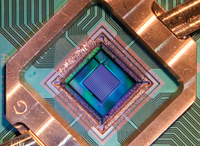
D-Wave's Murray Thom discusses the present and future of quantum computing.
Quantum Computing with D-Wave
D-Wave [1] was founded in 1999 with the goal to build quantum computing systems that help solve humanity's most challenging problems in areas such as government and defense, transportation and logistics, economic risk analysis, healthcare, and space research.
"A quantum computer harnesses the power of quantum mechanics – the laws of physics that govern all particles in the universe – to solve increasingly difficult problems" explained Murray Thom, director of Quantum Cloud Services at D-Wave. Classical computers use bits of information that live in one state (0 or 1) at a time. A quantum computer uses the quantum-mechanical principle of superposition to enable bits of information to be in both the 0 and 1 state simultaneously.
To harness these quantum effects requires an extreme environment: just above absolute zero in temperature (150 times colder than interstellar space) and the near elimination of magnetic fields that occur naturally on earth.
"The way in which we build such devices requires new materials, new design rules, new processor architectures, and, finally, new ways of programming," said Thom. "What we get after all this work is a faster, much more powerful computation system that can manipulate and assess all combinations of information concurrently, and solve previously unsolvable problems."
Quantum Advantage
The concepts surrounding quantum computing have been around since the early 1980s, and mathematicians and physicists have written many papers and given many lectures exploring the possibilities of quantum computing algorithms. In theory, a quantum computer should be able to solve some types of problems faster much faster than a conventional computer. In the real world, however, the first generation of quantum computers are considered experimental and still have not
...Buy this article as PDF
(incl. VAT)
